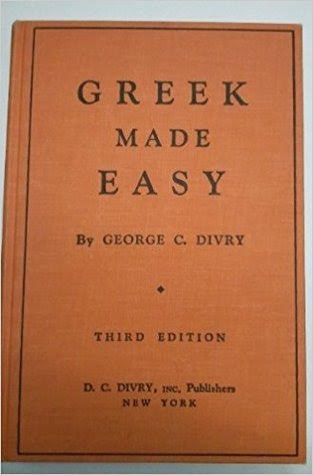θέλω (the-lo) was one of the first Greek words I learned. This came to pass because a well-meaning Greek friend (upon learning that I was studying Attic Greek) told me that the ancient language was too hard to learn so I should start with Modern Greek. He presented me with this book:

Greek Made Easy by George C. Divry was published the year of my birth (1963) and is apparently still in print. The new edition has a blue cover. It uses that good, old-fashioned textbook method to which people of my generation are accustomed. I highly recommend it to anyone who wants to learn Modern Greek. (Click the image to be transported to a oddly charming Greek e-commerce site)
My friend was right about one thing: Modern Greek is a greatly simplified version of the language. I’ve since learned that it is very similar to Medieval (or Byzantine) Greek. Going through the 190 pages of this little book and writing out all the exercises did help me learn. But my friend also underestimated my determined desire to read the ancient texts. As soon as I finished Divry’s lessons, I went right back to the task of learning the predecessor dialects: Attic and Koine. While it was an easy way to get started, I think learning modern Greek permanently retarded my pronunciation. During the Byzantine period the many vowel and diphthong sound of the ancient tongue were consolidated down to five. Epsilon, the short “E” and Eta, the long “E” are pronounced the same way, as are the long and shot “O.” Modern Greek also pronounces Delta and Theta the same way so I tend to turn the “D” sound into a “TH” for certain words I first learned from Mr. Divry’s book.
As I was saying, θέλω is one of the first verbs in the book. Modern Greeks use it pretty much exclusively for “want.” while of old it had more of the flavor of wishing or desiring and could also be used to mean “to be willing.” θέλω ψωμί και βούτυρο (the-lo pso-mi ki vu-ty-ro), “I want bread and butter,” was practically the first sentence of Greek I could speak. I’m not sure when or why bread became ψωμί instead of the ancient ἄρτος (ar-tos) but the word for butter (literally “cow cheese”) is the same one the ancients used. It was passed down through Latin to English preserving the “B” and “U” sounds of the ancients where modern Greek has turned them into “V” and “Y” respectively.
Another thing modern Greek lost are certain “moods” of verbs. This brings me to the gist of my point. When Luke tells us about the birth of John the Baptist, we learn that the guests at the circumcision ceremony think it’s a dumb idea for Elizabeth to name the child John. They appeal to her husband who is still deaf and dumb because he doubted the word of the Lord as delivered by Gabriel. When they sign to him asking what he desires to name the boy, the word θέλω is used.
Interestingly, θέλω here is in the Optative mood. Optative is so rarely used in the Bible that most Koine Greek textbooks only mention it in passing. It indicates hypothetical conditions, specifically things that one hopes or wishes will come to pass. Luke’s θέλω in the optative mood simply gets translated as “want” but when I read it in Greek I think “wish to want” or “hope to desire.”
What do you wish to want? What do you hope to desire? Often we desire things that we know are not the best for us. A second slice of Sweet Potato pie perhaps. Wouldn’t it be great if we only wanted exactly what was best? It seems impossible but that’s what I’m wishing to want anyway.



